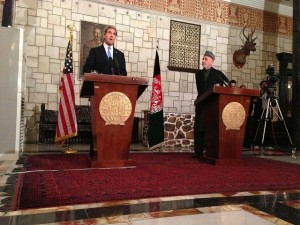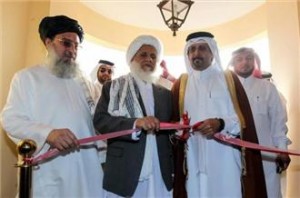U.S. officials have taken a cautious yet hopeful approach to the Taliban’s request last week to engage in peace talks with the U.S. and Afghan governments, but perhaps not cautious enough.
This past Tuesday, the Taliban opened an office in Doha, Qatar with the stated intention of using it as a base for diplomatic negotiations during the Afghanistan troop withdrawal and peace process.
While talks between the Taliban and U.S. have occurred in the past, none had the contextual backdrop of an official Taliban office and the looming 2014 troop withdrawal—circumstances that Afghan President Hamid Karzai understands all too well.
In a declarative move and infuriating Karzai, the Taliban flew their flag and installed a sign reading “Islamic Emirate of Afghanistan,” the official name of the Afghan state when they held power.
The Taliban subsequently chose to cancel any talks with U.S. officials as well.
While these disagreements may seem like political gamesmanship, they indicate a danger lurking in the future of any negotiations with the Taliban.
Per agreement, the Taliban office had to remain a political bureau for peace talks and could not evolve into an embassy used to compete with the Karzai government. However the Doha bureau seems to embody just that—an embassy for a government in exile.
As Max Fisher of the Washington Post points out, the Taliban have made little effort to at least ostensibly move beyond their claim to represent the legitimate government of Afghanistan. The office even lies nestled amongst recognized embassies. Taliban spokesmen at the first press conference stated that the purpose of the office was to meet with foreign diplomats and interact with the press—fairly consular activities. Not once did they mention the Afghan government.
Karzai immediately rejected any planned negotiations after the antagonizing display by the Taliban at the Doha office, and the U.S. has since struggled to salvage the peace talks.
Nonetheless the Taliban’s move to initiate these talks themselves and seemingly seek a peaceful stability for Afghanistan raises the question of why now? What has changed?
Many have pointed to the fast-approaching withdrawal of coalition forces in 2014. The looming troop departure has certainly influenced Taliban strategic timing, whether they wish to sincerely participate in the existing political system or simply rally international support for an opposition regime.
Coinciding with the withdrawal, however, is the end of President Karzai’s final term. This leaves a considerable power vacuum, both politically and militarily, in a fragile and untested system. Long-term motives aside, Taliban officials’ undoubtedly opened the office and engaged the U.S. with the beginning of this transition period in mind.
Despite an apparent earnestness to embrace diplomacy, Taliban actions have suggested that little has changed in their approach to the Afghan government.
The very nature of the Qatar office’s opening press conference demonstrated that they still see themselves as the true government of Afghanistan.
Moreover, Taliban officials have declared that they still will not abandon military attacks, killing four Americans during a mortar attack on Bagram Air Base hours after they announced their desire to engage the U.S. diplomatically.
Last night the Taliban affirmed this commitment to violence, carrying out an attack on the presidential palace in Kabul and the CIA headquarters.
 Given their ambiguous motives, U.S. officials must approach these already deteriorating Taliban negotiations with extreme caution. While constructive talks may still be salvageable, the U.S. should not fuel the political recognition the Taliban gained trough this past week’s fanfare.
Given their ambiguous motives, U.S. officials must approach these already deteriorating Taliban negotiations with extreme caution. While constructive talks may still be salvageable, the U.S. should not fuel the political recognition the Taliban gained trough this past week’s fanfare.
Sec. Kerry rightly stated that if peace talks don’t being soon, they may have to close the office in Doha. The Taliban cannot be allowed to use this as a political shield while they carry out business as usual and use terrorist tactics to target Americans and Afghans.
Ending the insurgency and the Taliban’s ties with al-Qaeda must remain the U.S. and Afghan governments’ top two priorities, and current Taliban aims do not seem to align with those ends.
Taliban spokesmen did verbally commit to no longer allow “anyone to cause a threat to the security of countries from the soil of Afghanistan,” but that falls far short of actually severing ties with al-Qaeda.
The Taliban have expressed interest in pursuing legal avenues to achieve their “objective,” but given their decision to continue fighting and the embassy-like qualities of the Doha office, that objective seemingly remains to abolish the current regime and reestablish Taliban control over Afghanistan.
Any decision to engage the Taliban diplomatically without a clearer indication that they have reoriented their violent methods and recognize the Afghan constitution runs the risk that the Taliban will simply use such negotiations to further their insurgent ambitions, and at the political and security expense of the U.S.



